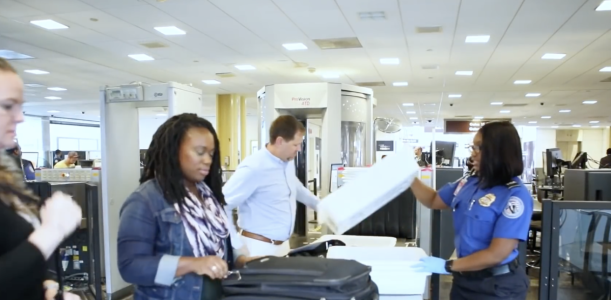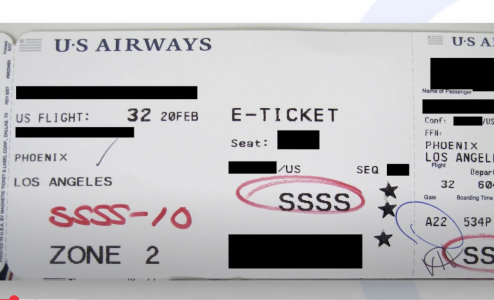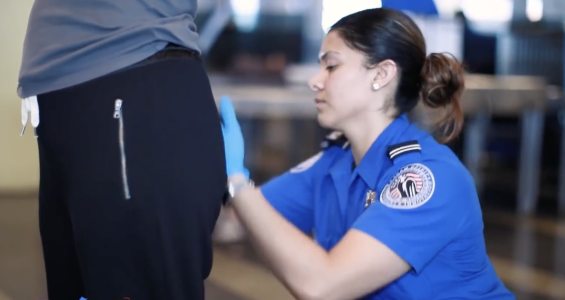Travelers are just noticing this boarding pass detail–Here’s what it means
- Replies 2
Traveling can be an exhilarating experience, filled with the promise of adventure and the joy of exploring new destinations.
However, for many seasoned travelers, the journey through the airport is often fraught with potential hiccups.
From the dread of flight cancellations and delays to the hustle and bustle of crowded terminals and the seemingly endless security lines, the path to your gate can be less than smooth sailing.
But there's a particular four-letter code that could signal an even more complicated airport experience, and it's not something you'd ever want to find stamped on your boarding pass.
The mysterious “SSSS”—a code that might as well stand for “Super Strict Security Screening” for those unlucky enough to receive it.
The “SSSS” code, which stands for “Secondary Security Screening Selection,” is a mark that the Transportation Security Administration (TSA) uses to indicate that a passenger requires additional screening.
This isn't a badge of dishonor, nor does it necessarily mean you've done anything to raise suspicion.

It's often applied randomly, but once it's on your boarding pass, prepare for a more intimate encounter with airport security.
Travel influencer Jordyn Verzera shared her partner JT Mocarski's experience with the “SSSS” code.
He was subjected to a rigorous security process that involved separating his belongings, emptying his bag completely, swabbing each item, and proving that his electronics were operational.
This level of scrutiny can be time-consuming and, for many, a stressful start to a journey.
For those selected for secondary screening, the process can be invasive. Passengers have reported having their phones scanned, with TSA agents copying texts, app messages, and photos.
This can feel like a violation of privacy, leaving travelers feeling exposed and uncomfortable.

The selection algorithm behind the “SSSS” code remains a mystery, with no clear explanation as to why certain individuals are chosen over others.
Veterans, federal employees, and even minors traveling alone have reported being flagged for additional screening, leading to confusion and frustration among those who believe they pose no threat.
He had what in his pants? Extra passenger? You won’t believe what the TSA found in this man’s pants!
The revelation of what “SSSS” stands for has sparked a wave of concern among travelers who fear the inconvenience and invasion of privacy it entails.
Recollections of personal experiences with the code have flooded social media, with many expressing their dismay and sharing their own stories of rigorous and sometimes embarrassing checks.

One traveler recounted the discomfort of having their personal messages and photos copied, while another mentioned the frequency with which they were flagged as a solo minor traveler.
The lack of transparency in the selection process has left many questioning the effectiveness and fairness of the TSA's methods.
You might like: Flying at 106: The unexpected airport moment that caught one woman off guard—twice a year
While there's no surefire way to avoid being selected for secondary screening, being aware of the “SSSS” code and its implications can help you prepare for the possibility.
Source: Simple Flying / Youtube.
If you find the code on your boarding pass, it's wise to arrive at the airport earlier than usual to account for the extra time you'll spend with security.
Read next: Protect your vacation: The shocking social media mistake every traveler must avoid

Have you ever encountered the “SSSS” code on your boarding pass? How did you handle the additional screening? What advice would you give to fellow travelers who might face this situation? Join the conversation in the comments below!
However, for many seasoned travelers, the journey through the airport is often fraught with potential hiccups.
From the dread of flight cancellations and delays to the hustle and bustle of crowded terminals and the seemingly endless security lines, the path to your gate can be less than smooth sailing.
But there's a particular four-letter code that could signal an even more complicated airport experience, and it's not something you'd ever want to find stamped on your boarding pass.
The mysterious “SSSS”—a code that might as well stand for “Super Strict Security Screening” for those unlucky enough to receive it.
The “SSSS” code, which stands for “Secondary Security Screening Selection,” is a mark that the Transportation Security Administration (TSA) uses to indicate that a passenger requires additional screening.
This isn't a badge of dishonor, nor does it necessarily mean you've done anything to raise suspicion.

“SSSS” stands for “Secondary Security Screening Selection”, indicating additional security checks for selected passengers flying to or from the US. Image source: Simple Flying / Youtube.
It's often applied randomly, but once it's on your boarding pass, prepare for a more intimate encounter with airport security.
Travel influencer Jordyn Verzera shared her partner JT Mocarski's experience with the “SSSS” code.
He was subjected to a rigorous security process that involved separating his belongings, emptying his bag completely, swabbing each item, and proving that his electronics were operational.
This level of scrutiny can be time-consuming and, for many, a stressful start to a journey.
For those selected for secondary screening, the process can be invasive. Passengers have reported having their phones scanned, with TSA agents copying texts, app messages, and photos.
This can feel like a violation of privacy, leaving travelers feeling exposed and uncomfortable.

Receiving the “SSSS” code on a boarding pass can lead to a much higher level of security, including separate checks and swabbing of belongings. Image source: Simple Flying / Youtube.
The selection algorithm behind the “SSSS” code remains a mystery, with no clear explanation as to why certain individuals are chosen over others.
Veterans, federal employees, and even minors traveling alone have reported being flagged for additional screening, leading to confusion and frustration among those who believe they pose no threat.
He had what in his pants? Extra passenger? You won’t believe what the TSA found in this man’s pants!
The revelation of what “SSSS” stands for has sparked a wave of concern among travelers who fear the inconvenience and invasion of privacy it entails.
Recollections of personal experiences with the code have flooded social media, with many expressing their dismay and sharing their own stories of rigorous and sometimes embarrassing checks.

The code does not imply wrongdoing by the traveller but can lead to a more invasive and time-consuming security process. Image source: Simple Flying / Youtube.
One traveler recounted the discomfort of having their personal messages and photos copied, while another mentioned the frequency with which they were flagged as a solo minor traveler.
The lack of transparency in the selection process has left many questioning the effectiveness and fairness of the TSA's methods.
You might like: Flying at 106: The unexpected airport moment that caught one woman off guard—twice a year
While there's no surefire way to avoid being selected for secondary screening, being aware of the “SSSS” code and its implications can help you prepare for the possibility.
Source: Simple Flying / Youtube.
If you find the code on your boarding pass, it's wise to arrive at the airport earlier than usual to account for the extra time you'll spend with security.
Read next: Protect your vacation: The shocking social media mistake every traveler must avoid
Key Takeaways
- “SSSS” stands for “Secondary Security Screening Selection”, indicating additional security checks for selected passengers flying to or from the US.
- Receiving the “SSSS” code on a boarding pass can lead to a much higher level of security, including separate checks and swabbing of belongings.
- The code does not imply wrongdoing by the traveller but can lead to a more invasive and time-consuming security process.
- Passengers sharing their experiences with the “SSSS” code have described it as violating and inconvenient, with some questioning the selection algorithm.
Have you ever encountered the “SSSS” code on your boarding pass? How did you handle the additional screening? What advice would you give to fellow travelers who might face this situation? Join the conversation in the comments below!






